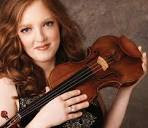Rachel Barton Pine spotlights black composers' violin concertos
Rachel Barton Pine, a protean concert violinist with a compelling discography on Cedille Records, has
 |
| Rachel Barton Pine champions black composers. |
done much more than give a nod to diversity in classical music. In addition to expanding her repertoire to bring black composers to the public, she set up a project through her foundation to redress the neglect of their music. That was more than 20 years ago, so she can't be accused of jumping on a bandwagon.
Her latest investment as recording artist in this music is "Violin Concertos by Black Composers Through the Centuries" (Cedille). Despite its bland academic title, the disc makes an exciting case for music by composers whose reputations are only recently gaining ground.
 |
| Jose White Lafitte (1836-1918) |
After a forceful, long orchestra tutti, the soloist enters with decorative, yet purposeful material. The solo part demands deftness from the soloist. Pine compares its requirements to Saint-Georges' esteemed accomplishments with the sword. The Largo second movement has a relaxed barcarolle-like flow and tempo; there's nothing fancy in the cadenza, which is fitting. The Rondeau third movement proceeds with the dash and elan reminiscent of a Vivaldi finale.
For melodic charm, the better of the three-movement concertos here is by Jose White, whose Afro-Cuban heritage is less explicitly at play in the music than the influence of his time in France. I've known this piece for a few decades through Columbia's Black Composer Series, for which it was recorded by the London Symphony Orchestra (Paul Freeman conducting) with Aaron Rosand (1927-2019) in the solo role. A distinguished exponent of the Romantic repertoire, Rosand also shares with Pine a metropolitan Chicago origin (he in Hammond, Indiana; she in Chicago).
The old recording benefits, of course, from a more established and expert accompaniment. Yet I would place Pine's reading of the solo part on the same high level of expressive understanding and technical aplomb as Rosand's. To my ears, she plays it as if she believes in it more than Rosand seems to have, though his tossed-off manner has a certain charm. The Cedille recording quality is better, too.
Free of empty display, the solo part travels readily over the instrument's whole range, requiring not only agility but tonal security. Her low-register tone in the first movement's secondary theme is superb. After the tender Adagio, fused with the first movement, a rondo finale blessed by more good melody and dazzling virtuosity wraps things up.
The disc is filled out by two one-movement pieces, the Romance in G major by the Anglo-African Samuel Coleridge-Taylor, and Violin Concerto No. 2 by the currently fashionable Florence Price. The solo violin inserts itself gently into Coleridge-Taylor's understated introduction. The Romance's strong middle section eventually yields to a sugary concluding episode. The unpretentious connotations of the "romance" label help the piece come across.
Lots of orchestral variety is thrown into the orchestral introduction to Price's concerto. In contrast with the other three works on Pine's disc, the accompaniment here is by the Royal Scottish National Orchestra, conducted by Jonathon Heyward.
Immediately Price displays her American assertiveness — an understandable desire for music-lovers to take notice. Splashes of celesta among the brass and cymbals arrest the attention, as they do again at the piece's climax, crowned by a dreamy coda nailed down by forceful chords. The restless, street-wise quality may owe something to Gershwin.
Pine is thoroughly conversant with the score's recurrent urgency, even though the violin's entrance and much of its subsequent manner are playful and slightly bluesy, another approach to making a favorable impression on her compatriots. That's helped give her music currency nearly 70 years after her death.



Comments
Post a Comment